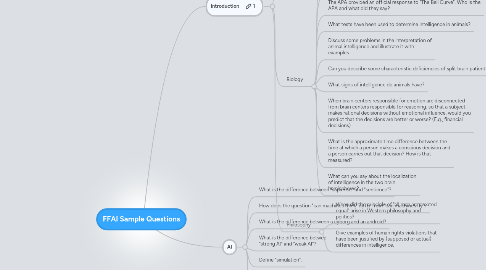
1. AI
1.1. What is the difference between "sapience" and "sentience"?
1.2. How does the question "can machines think" differ from "can machines fly"?
1.3. What is the difference between a cyborg and an android?
1.4. What is the difference betwee "strong AI" and "weak AI"?
1.5. Define "simulation".
1.6. Can you "simulate a sorting algorithm"? Discuss.
1.7. Name some common objections to the possibility of strong AI/weak AI.
2. Introduction
2.1. Psychology
2.1.1. Define "intelligence"?
2.1.2. How is intelligence measured?
2.1.3. Is intelligence innate or alterable?
2.1.4. What kinds of measures correlate strongly with measures of intelligence?
2.1.5. Name some mental capabilities that are tested by intelligence tests.
2.1.6. Statistically, does student performance in mathematics predict student performance in English strongly/weakly/not at all?
2.1.7. Why is the IQ called the "intelligence quotient"?
2.1.8. What does the theory of multiple intelligences say? How does it relate to commonly used definitions of "intelligence"?
2.1.9. How is IQ defined today?
2.1.10. What is the "Flynn effect"?
2.2. Biology
2.2.1. Is intelligence heritable?
2.2.2. What was the book "The Bell Curve" about and why was it controversial?
2.2.3. The APA provided an official response to "The Bell Curve". Who is the APA and what did they say?
2.2.4. What tests have been used to determine intelligence in animals?
2.2.5. Discuss some problems in the interpretation of animal intelligence and illustrate it with examples.
2.2.6. Can you describe some characteristic deficiencies of split brain patients and what they tell you about the nature of the human mind?
2.2.7. What signs of intelligence do animals have?
2.2.8. When brain centers responsible for emotion are disconnected from brain centers responsible for reasoning, so that a subject makes rational decisions without emotional influence, would you predict that the decisions are better or worse? (E.g., financial decisions)
2.2.9. What is the approximate time difference between the time at which a person makes a conscious decision and a person carries out that decision? How is that measured?
2.2.10. What can you say about the localization of intelligence in the two brain hemispheres?
2.3. Philosophy
2.3.1. When did the principle of "all men are created equal" arise in Western philosophy and politics?
2.3.2. Give examples of human rights violations that have been justified by (supposed or actual) differences in intelligence.
